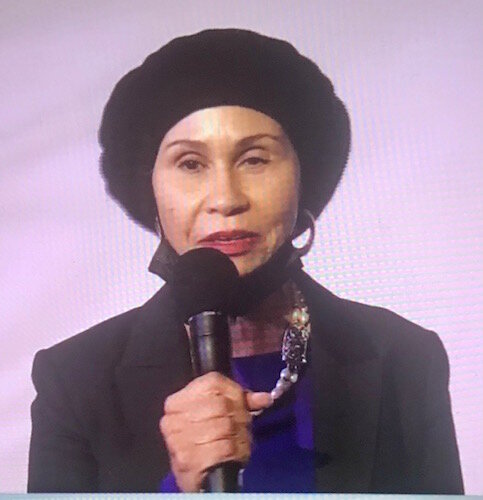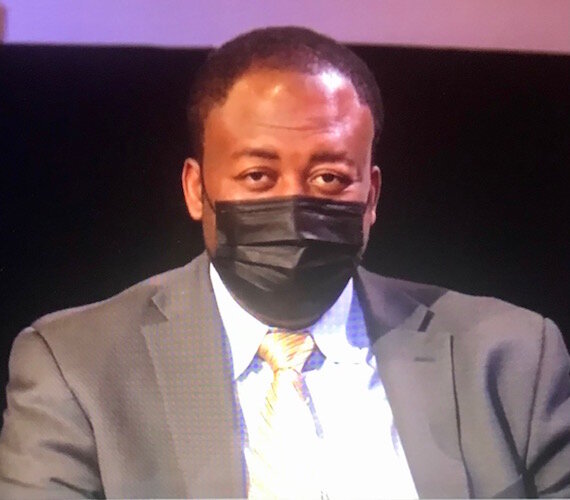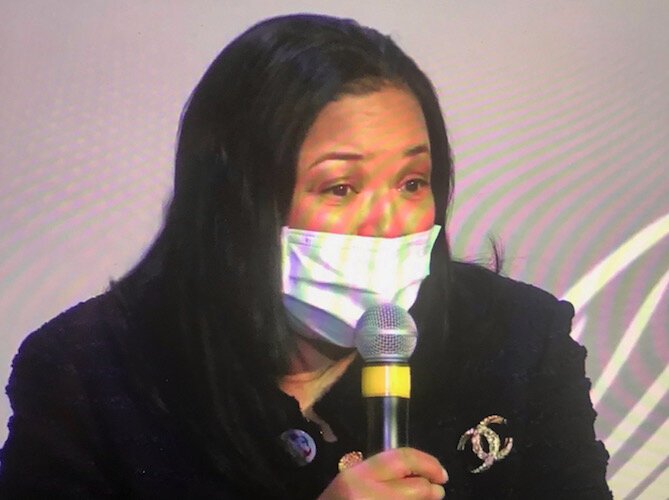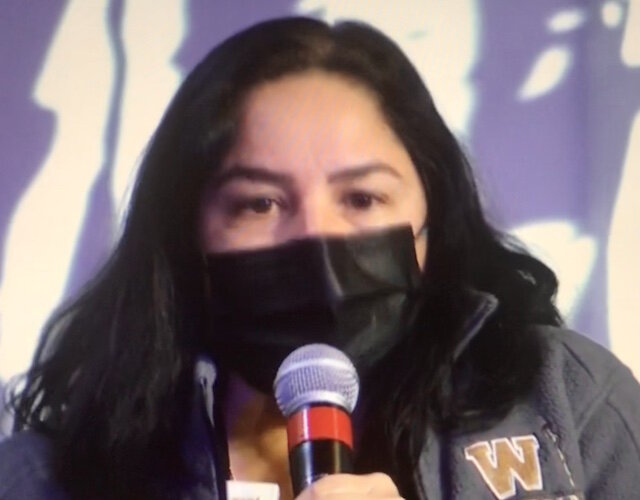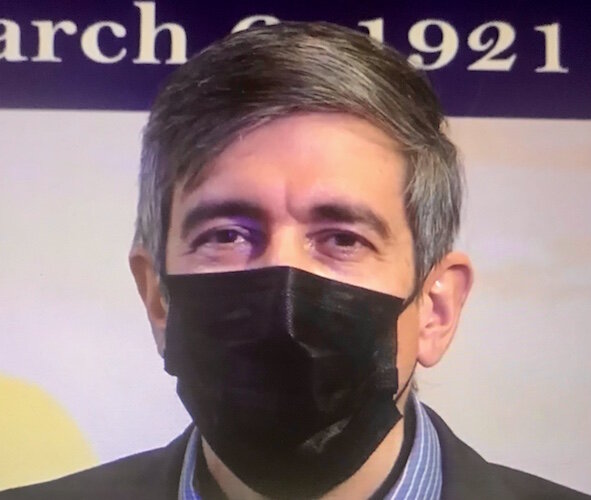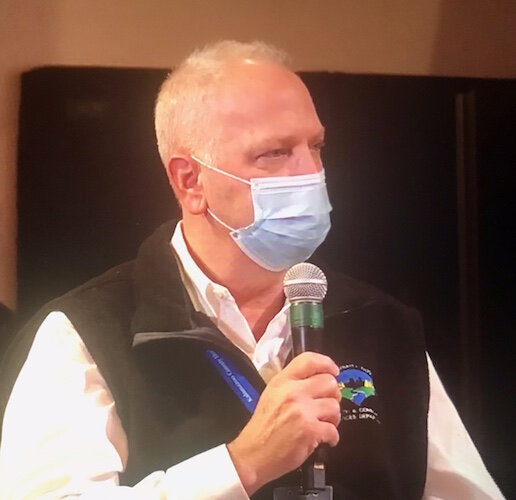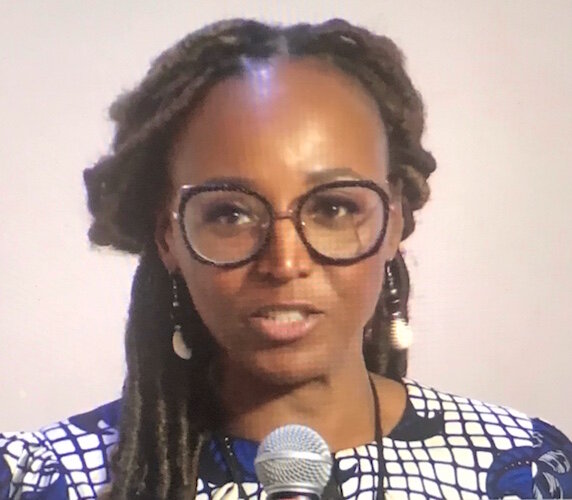The COVID vaccines: Kalamazoo’s medical community answers all your questions
When it comes to the COVID-19 vaccine, "I recommend it to all my loved ones. So I recommend it to you," says Dr. Martinson Arnan said of the first and second shots produced by Pfizer.
Editor’s note: This story is part of Southwest Michigan Second Wave’s On the Ground Kalamazoo series.
Vaccines to prevent the spread of COVID-19 are effective, safe, and the best way to avoid contracting the potentially deadly virus.
A panel of nine physicians and health care professionals delivered that message in Kalamazoo during a Thursday evening question-and-answer session about the new vaccines that are being delivered nationwide to put an end to the COVID pandemic.
“I’m a doctor and I’ve gotten the vaccine. I’ve gotten both shots,” Dr. Martinson Arnan said of the first and second shots of the coronavirus vaccine produced by Pfizer Inc. The vice president and chief clinical officer at Bronson Healthcare Group said he can speak authoritatively about the vaccine because he has been inoculated.
“So far, all the evidence that we have suggests that this is safe,” Arnan said. “I would recommend it to my mom. I would recommend it to my dad, may his soul rest in peace, and I recommend it to all my loved ones. So I recommend it to you.”
Thursday’s digital event, live-streamed from Mt. Zion Baptist Church on its YouTube and Facebook sites, was an attempt to motivate the community in general, and minorities in particular, to become vaccinated.
“There are a lot of concerns that the community has about the COVID disease as well as what can prevent it,” said Dr. Cheryl Dickson, associate dean for Health Equity and Community Affairs Department at the WMU Homer Stryker M.D. School of Medicine (WMed).
The medical school is partnering with the Northside Ministerial Alliance and others to answer questions and dispel unnecessary fears about the new vaccines. A 90-minute discussion about the vaccines was led by Rev. Addis Moore, president of the Northside Ministerial Alliance and pastor of Mt. Zion Baptist Church, and Stephanie Williams, former Kalamazoo County commissioner and founder of the Mothers of Hope program.
Adding to the conversation was Sidney Ellis, executive director of the Douglass Community Association.
Here are some of the questions that were asked and answered during the program:
QUESTION: How effective is it to be vaccinated?
ANSWER: “What we know about the vaccine so far in terms of the trials that were done, suggests that its safety profile so far has been remarkably good,” Arnan said. “You might say it’s too short of a time to know all of those things. That’s true. But one thing that we know about vaccines, because we’ve been giving vaccines for many many years, is that most of the biggest concerns with a vaccine happen within a short time period.”
Since its introduction in recent weeks, there have been no major negatives with the treatments. Pharmaceutical maker Pfizer, using its huge manufacturing plant in Portage, is producing a vaccine that is administered in two doses, the second dose coming 21 days after the first. Massachusetts-based Moderna Therapeutics Inc. is producing a vaccine with two doses that are administered 28 days apart.
Physicians who participated in Thursday’s gathering at Mt. Zion Baptist Church said each of the treatments is very similar and each has been shown to be 95 percent effective in preventing patients from contracting COVID.
Arnan said there is enough reliable data to show “that people are tolerating the medicine very well.”
Q: Is the vaccine available? And is there enough to go around?
A: “The vaccine supply has been unpredictable,” said Dr. Aaron Lane-Davies, a pediatrician and chief of quality at Bronson Healthcare Group, “So we were only able to open as many slots (for vaccinations) as we have vaccine.
James Rutherford, health officer with the Kalamazoo County Health and Community Services Department, said, “Vaccine began to roll out a while ago. It’s in Kalamazoo County. It’s being distributed by a couple of different partners — both Bronson and Borgess health systems are distributing the vaccine in partnership with the Family Health Center. We’re also providing the vaccine at the local public health department.”
But he said it is, unfortunately, being delivered slowly.
“Our challenge is that we can’t even really estimate what we’re going to get from week to week,” he said. “Some weeks we get what we request. Other weeks we don’t get anything at all.”
But Rutherford said the health community in Kalamazoo County has been able to vaccinate just about everyone in what is called the 1A prioritization category. That involves first responders, health care workers at hospitals, Emergency Medical Technicians, and people who respond to emergencies.
“We’ve started doing 1B, which is a much larger group,” Rutherford said referring to people over age 65, and people age 16 or older who have at least one chronic medical condition that puts them at increased risk for severe illness from the virus (such as cancer, kidney disease, heart conditions and/or COPD).
“Individuals over the age of 65 comprise probably close to 45,000 residents in Kalamazoo County,” he said. “So that’s a really large group.”
He said they are also working to inoculate about 6,000 employees of kindergarten through grade 12 schools who want it.
“We know that this disease has affected the elderly population more than any other population,” Rutherford said. “I’d say probably close to 94 percent of our fatalities in Kalamazoo County are with people over 60. So it’s really important that we focus on that population.”
Lane-Davies said people can check Bronsonhealth.com to see if there is a vaccine available and click on a link to sign up to be vaccinated.
Denise Crawford, president and chief executive officer of Family Health Center in Kalamazoo, said COVID-19 has disproportionately impacted African-American and Hispanic people so the health center is using simple phone calls (at 269-488-0804) to try to make it as easy as possible for people to sign up to be vaccinated. It was set to administer shots on Friday (Jan. 22) in the parking lot of Stones Church (1225 W. Paterson St.) to people 65 and older who called in to register.
Q: How does the vaccine work?
A: Vaccines take a small segment of the COVID-19’s genetic codes “and because the body that God has developed is so smart, it takes that information and it reads it like a book,” Arnan said. “… And just that information is sufficient to start making your body prepare to fight it in case you should have that virus.”
Using an analogy to explain that only a segment of the virus’ code is used, he said, “If there was a serial killer on the loose and I wanted to warn you to be careful, I don’t need to bring the serial killer into your home. I just show you a picture. So when you see the picture of that person walking through your driveway, you’re ready. And that’s how this (vaccine) works.”
Q: What do you tell people — particularly minorities — who are apprehensive about tests and don’t trust what they have been hearing?
A: Arnan said, “Even though sometimes it’s hard to trust what we hear, it is also important to know that some of the people who have been involved with helping to make this vaccine have committed their lives — people like me — to be able to do good science so this good science can make a difference in the lives of our communities.”
Arnan is African-American. He said 10 percent of the people who were involved in trials of the vaccines were African-American.
Q: How much does it cost to get vaccinated?
A: “You will not get charged for the vaccine when you get it,” Rutherford said.
Q: Is it safe for people who have asthma to get vaccinated?
A: Yes, Lane-Davies said. The vaccines have the potential to help protect people with asthma and underlying conditions.
“Asthma is commonly triggered and made worse by viral infections,” he said. “And we know that protecting ourselves from the viruses that are circulating in our community, including from the coronavirus, … helps to protect people with asthma and other underlying conditions that we know are at higher risk.”
Arnan said the only group of people that doctors must evaluate and very carefully monitor if they are to use the vaccines are people who have previously had a severe allergic reaction to some other injectable medicine or some other vaccine in the past.
Q: For how long is the vaccine effective?
A: “The vaccine has not been around long enough for us to know potentially how long,” Arnan said. “But a lot of evidence, even some from the early trials, suggests that people had immunity that was going beyond four months. … There is a lot of confidence in the scientific community that you could have protection that could last up to a year and that’s a great thing because it allows the long dark winter of this virus to pass us by as soon as possible.”
Q: If I get vaccinated, do I still need to wear a mask and do social distancing?
A: “It’s hard to imagine this vaccine being any better,” said Dr. William Nettleton, medical director at the Kalamazoo County Health and Community Services Department. “It’s an excellent vaccine.”
But he said, “I think about this in terms of the Swiss cheese model. We’ve got to use all the tools we have in our toolbox to plug the holes in the Swiss cheese, to stop the spread of COVID-19 in our community.”
That includes wearing masks and social distancing.
“And plus,” he said, “We’re not all being vaccinated at the same time. So when you’re going out to the grocery store, you’re not going to know who’s been vaccinated and who hasn’t.”
Q: The youngest person to test positive for COVID in Kalamazoo was 2 months old. At what age should children be vaccinating?
A: Dr. Kathy Jackson, a pediatrician with the Family Health Center in Kalamazoo, said the new vaccines are only for people ages 16 and older. She said that emphasizes the need for people around them to be vaccinated. “When you get vaccinated, you’re not only doing it for yourself or your immediate family but those that you work with … So you’re doing this in hope of providing part of that herd immunity which is what we’re hoping to achieve between those vaccinated and those who have had the virus itself. And then we will safely be able to have our children return to school where they need to be in order to thrive.”
She said, “This virus isn’t just a health issue. It’s an economic issue. It’s an education issue. There’s not anyone in this room who has not been affected by this in some way.”
Q: Should people who are immuno-suppressed, or being treated for cancer or other conditions get vaccinated? And can you get COVID by getting vaccinated?
A: “There’s nothing in the vaccine that’s live,” said Dr. Thomas Flynn, chief of the Division of Infectious Diseases at WMed. “You can’t get COVID from the vaccine. So there’s nothing live in it and the options between not getting the vaccine … versus getting the vaccine, there’s no comparison. The vaccine is safe.”
Q: If you get the first dose and don’t get the second (or if the second dose becomes unavailable), how effective is that?
A: “The data from the trials from both Moderna and Pfizer suggest that there is reasonable immunity after the first dose — somewhere around 80 percent,” Lane-Davies said. “After two doses that goes up to 95 percent. But we don’t know how long the immunity lasts with the first dose alone. So we strongly, strongly encourage people to get both doses.”
Q: Are there symptoms that result from having the vaccine?
A: “Most vaccines will give you tenderness at the site of the injection,” Flynn said. “Everybody I know said the second shot gave them a little more tenderness than the first. Some people have told me that they’ve had a little bit of chilliness and gone to bed early, especially after the second (dose of the) vaccine.”
He said he also knows someone who had a rash as a result. But that can occur with viruses without the vaccine.
“Every once in a while you’ll see something that is a little unusual,” Flynn said. “But by and large, it’s going to be a low-grade fever if there’s a fever at all. And muscle aches and soreness that usually lasts less than 24 hours — probably worse on the second shot than on the first shot.”
Q: What’s the difference between the Pfizer and Moderna vaccines?
A: “Both vaccines use the same technology to help your immune systems,” Lane-Davies said. “They are both vaccines that help your body make a tiny portion of the virus so that your body’s immune system can recognize and help to build a defense against that.”
With both vaccines, 95 people out of 100 were shown to be immune or unable to catch the virus, Lane-Davies said. And the 5 percent who did catch the virus after vaccination had very mild symptoms and were at low- to no-risk of death.
Q: What about the vaccines and pregnant women?
A: “We don’t have any studies on pregnant women,” said Dr. Sylvia Linares, assistant professor in the Department of Obstetrics and Gynecology at the WMU Homer Stryker M.D. School of Medicine. “… What we know for sure, and I have seen it, is pregnant women, when they get COVID, they get really sick. And that is the reason that we recommend pregnant women use the vaccine. Later on, probably we will have more data. But we don’t have the information right now.”
Q: Do the vaccines protect against new strains of COVID?
A: Nettleton said viruses change over time and how effective the new vaccines will be against new strains has not yet been studied. But he said, “Right now we don’t have evidence to suggest the vaccines will be less effective.” He said that reports of a new strain of COVID that is reportedly coming out of the United Kingdom indicate that it is no more deadly than the current strain, but it may spread more easily. “So that’s another reason, actually, to vaccinate, and to vaccinate as soon as possible — as many of our community members as possible.”
Linares, who is Hispanic, said minorities have reasons to be skeptical of the health care community because some have been used as guinea pigs for testing in the past. But she said she talks to people in the community and tells them they need to fight for their rights to good health care. That includes the new vaccines.
“Historically, we like to be together,” Linares said. “When we learn to be together and take care of each other, we are a better community. So it’s the start of the conversation we are having right now.”
Of COVID, Crawford said, “We have witnessed and experienced it killing our people. We know that it has to stop and we believe this is the most effective way. And so because of that, I strongly encourage you, I plead with you, to please help us stop this virus. Help us stop the killing of our population.”

